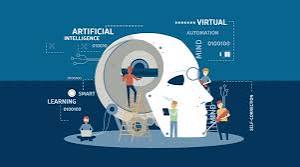AI in Everyday Life: How Artificial Intelligence is Changing the Way We Live

Artificial intelligence (AI) has become a transformative force, reshaping industries, redefining how we interact with technology, and even influencing the smallest aspects of our daily lives. From voice assistants to personalized recommendations, AI is no longer just a futuristic concept—it is a reality that surrounds us.
In this article, we explore how AI is integrated into everyday life, the benefits it brings, and how it is shaping the future.
What Is Artificial Intelligence?
AI refers to the simulation of human intelligence by machines. It enables computers and systems to perform tasks such as learning, reasoning, problem-solving, and decision-making. AI systems often rely on machine learning (ML), natural language processing (NLP), and neural networks to process data and improve over time.
The applications of AI range from simple algorithms to advanced systems capable of driving cars, diagnosing diseases, and even creating art.
How AI is Changing Everyday Life
1. Smart Assistants and Home Automation
Devices like Amazon Alexa, Google Assistant, and Apple Siri have become staples in many households. These AI-powered virtual assistants help users perform tasks such as setting reminders, answering questions, and controlling smart home devices.
- Examples of Use:
- Adjusting home temperatures via smart thermostats.
- Automating lights and appliances with voice commands.
- Creating shopping lists or scheduling appointments.
2. Personalized Recommendations
AI has revolutionized how we consume content, whether it’s watching TV shows, shopping online, or listening to music. Streaming platforms like Netflix and Spotify use AI algorithms to analyze viewing and listening habits, recommending content tailored to individual preferences.
- In Retail: E-commerce platforms like Amazon use AI to suggest products based on browsing history, increasing convenience and enhancing the shopping experience.
3. Healthcare Advancements
AI has significantly impacted the healthcare industry, improving diagnostics, treatment plans, and patient care.
- Applications in Medicine:
- AI-powered tools like IBM Watson assist doctors in diagnosing complex diseases.
- Wearable devices monitor health metrics like heart rate and sleep patterns, providing real-time insights.
- AI algorithms analyze medical images to detect conditions such as cancer more accurately and quickly.
4. Transportation and Navigation
AI has redefined transportation, making travel safer and more efficient.
- Autonomous Vehicles: Companies like Tesla are developing self-driving cars that use AI to interpret surroundings, avoid obstacles, and make driving decisions.
- Navigation Systems: GPS apps like Google Maps and Waze use AI to provide real-time traffic updates, suggest alternate routes, and estimate travel times.
5. AI in Education
AI is transforming how students learn and teachers teach.
- Online Learning: Platforms like Coursera and Khan Academy use AI to personalize learning experiences, adapting course material to individual student needs.
- Administrative Efficiency: AI tools automate tasks like grading and attendance tracking, freeing up teachers to focus on instruction.
6. Customer Service Automation
Chatbots and virtual assistants powered by AI are now commonplace in customer service.
- Examples:
- Chatbots on websites provide instant answers to common questions.
- AI systems handle customer complaints and inquiries 24/7, improving response times.
7. Enhancing Cybersecurity
AI plays a critical role in detecting and preventing cyber threats.
- How It Works:
- AI-powered tools monitor network traffic for anomalies and identify potential breaches.
- Machine learning algorithms can predict and counteract new types of cyberattacks, keeping data secure.
8. AI in Financial Services
From fraud detection to investment strategies, AI has revolutionized financial services.
- Applications:
- Banks use AI to monitor transactions for suspicious activity, reducing fraud.
- Robo-advisors provide personalized investment advice based on user preferences and risk tolerance.
- AI streamlines loan approval processes by analyzing creditworthiness more efficiently.
Benefits of AI in Everyday Life
- Increased Efficiency: AI automates repetitive tasks, saving time and allowing people to focus on more meaningful activities.
- Improved Accuracy: AI reduces human error in tasks like medical diagnoses, financial transactions, and data analysis.
- Personalization: AI tailors experiences to individual preferences, from entertainment to education.
- Accessibility: AI technologies like speech-to-text and text-to-speech enable people with disabilities to interact with the world more easily.
- Cost Savings: Automation reduces labor costs in various industries, leading to more affordable services and products for consumers.
Challenges and Ethical Concerns
While AI brings numerous benefits, it also raises concerns that must be addressed:
- Privacy Issues: AI systems collect vast amounts of personal data, raising concerns about how this information is used and stored.
- Job Displacement: Automation may lead to job losses in certain sectors, requiring workers to adapt to new roles.
- Bias in AI: Algorithms can inherit biases from the data they are trained on, leading to unfair outcomes in areas like hiring and lending.
- Security Risks: AI systems themselves can be targets of cyberattacks, potentially causing widespread disruption.
- Ethical Dilemmas: Decisions made by AI in areas like healthcare and law enforcement raise questions about accountability and fairness.
The Future of AI in Everyday Life
As AI continues to evolve, its potential to improve our lives is boundless. Future developments may include:
- Smarter Homes: Fully automated homes that anticipate your needs and adjust settings without input.
- AI in Space Exploration: Advanced AI systems guiding missions to explore distant planets.
- Revolutionized Healthcare: Personalized medicine tailored to individual genetic profiles.
- Enhanced Education: Virtual reality powered by AI for immersive, interactive learning experiences.
Final Thoughts
Artificial intelligence is no longer a concept of the future—it is an integral part of our present. From simplifying daily tasks to transforming industries, AI has the power to enhance our lives in countless ways. However, it’s important to address the ethical and societal challenges it presents to ensure its benefits are accessible to all.
Embracing AI responsibly can lead to a smarter, more efficient, and connected world. By understanding its capabilities and limitations, we can leverage AI to improve our lives and create a brighter future. The age of AI is here—are you ready to make the most of it?



